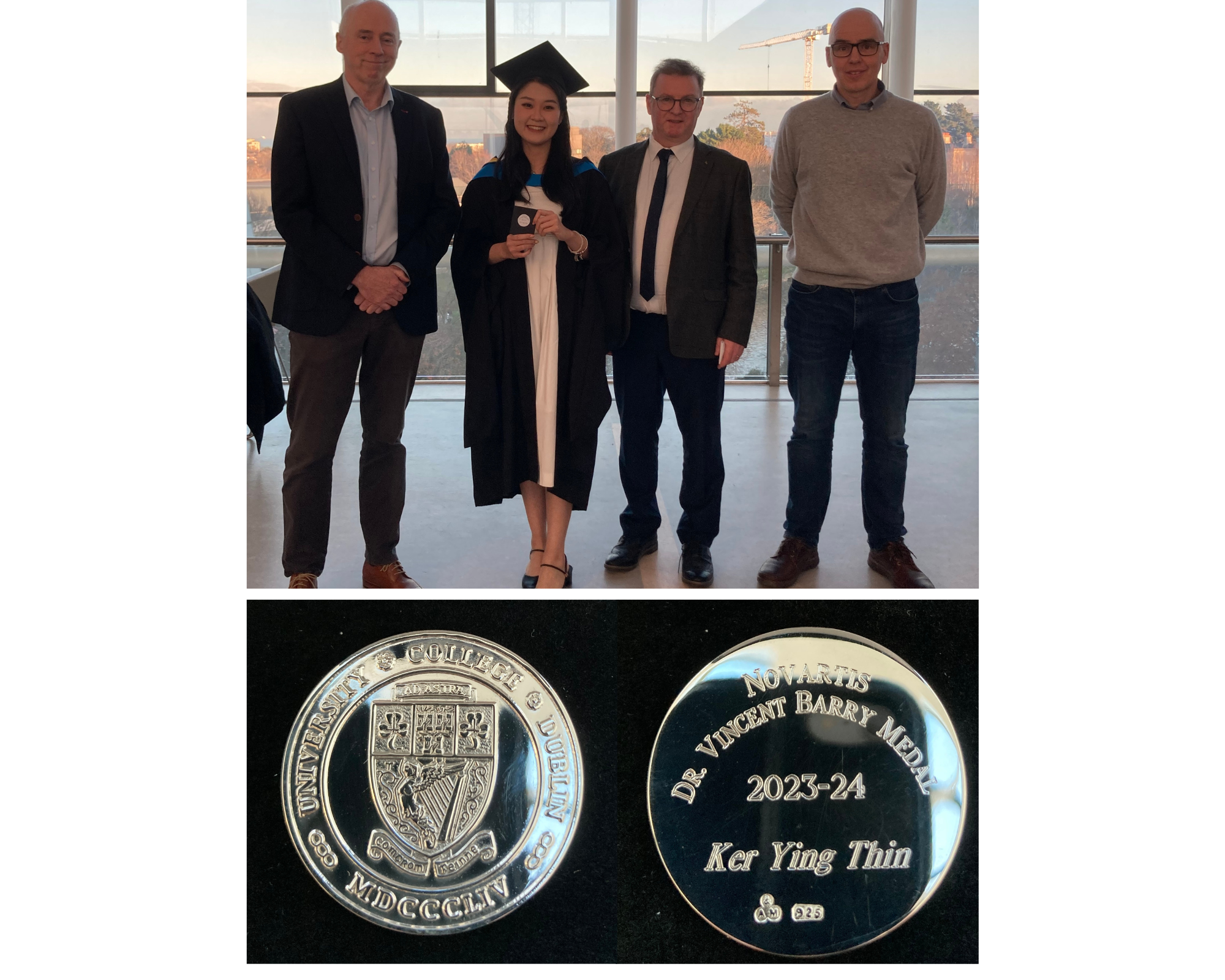Novartis Dr Vincent Barry Medal 2023/2024
News & Events
- Current School News
- School of Chemistry Seminar Series
- School of Chemistry Newsletters
- Professor Raphael Darcy RIP
- Novartis Dr. Vincent Barry Medal 2024/25 awarded to Arun Madathil
- Graduate Research Conferring 3rd December 2025
- Taught MSc 2024/25 Award and Conferring
- Dr. Úna McCarthy-Fakhry wins UCD Alumni Award in Science
- 28th Wheeler Lecture 2025
- September 2025 Conferring
- Three New Ad Astra Fellows Join the School
- Charles Loh Wins Prestigious 2025 Advanced Science Young Innovator Award
- Conferring June 2025
- Undergraduate Stage 4 Medals & Project Prizes 2024/25
- Organic Chemistry Summer School 2025
- Dublin Chemistry 3rd Year Talks 2025
- BOC Gases Awards 2025
- Nobel Laureate Prof Meldal Signs Chemistry Glass Wall
- News Archive
- Professor David Feakins Obituary
- International Day of Women and Girls in Science
- Michael McGlinchey at 80 Symposium
- Novartis Dr Vincent Barry Medal 2023/2024
- Taught MSc Conferring December 2024
- Graduate Research Conferring December 2024
- ZJNU Visit to UCD School of Chemistry 2024
- Professor Emerita Dervilla M.X. Donnelly: 1930 – 2024
- 2023/24 Stage 4 Medals & Prizes
- Conferring September 2024
- 9th EuChemS Chemistry Congress
- 3rd Year Talks 2024
- Professor Stefan Oscarson's Last Lecture
- BOC Gases Graduate Research Annual Awards
- Conferring December 2023
- Wheeler Lecture 2023
- Professor Dervilla Donnelly Portrait Unveiling
- Chemistry Conferring September 2023
- Conferring June 2023
The Novartis Dr. Vincent Barry Medal 2023/2024 awarded to Ker Ying Thin
The new Novartis sponsored Dr. Vincent Barry Medal was awarded for the first time on Monday 2nd December 2024 and we were delighted to have Shane Hayes of Novartis in UCD to make the presentation in person.
Ker Ying Thin is the very first recipient of the Novartis – Dr. Vincent Barry Medal. She received this accolade for being the best performing student by achieving the highest Grade Point Average (GPA) and an overall First Class Honours result in the School of Chemistry Taught MSc Programmes in the 2023/24 academic year.
-300x560.jpg)
Ker Ying Thin and Shane Hayes of Novartis
This Medal is named for Dr. Vincent Barry who was awarded a first class honours BSc degree in Chemistry in 1928 by UCD and went on to make a significant contribution managing the team that uncovered the anti-leprosy drug clofazimine. Clofazimine was first synthesised in 1954 by a team of scientists led by Dr. Barry. It was originally targeted at Tuberculosis but was later found to be very effective against leprosy. Dr. Barry and his team donated the rights to Clofazimine to Novartis so that it could be provided to leprosy sufferers on a non commercial basis. In 1969, Novartis launched it under the brand name Lamprene.
The fight against leprosy is one of the greatest public health successes in history. Yet, still today, 2 to 3 million people are living with physical disability and stigma as a result of the disease. For more than 30 years, Novartis has been working with partners around the world to (opens in a new window)eliminate leprosy. Multidrug therapy (MDT) of which Clofazimine is the original component, has been a major breakthrough in the treatment of leprosy and its free availability has reduced the global disease burden by 95% in the past three decades.
Since 2000, Novartis has donated more than 70 million blister packs of multidrug therapy (MDT) valued at approximately USD 124 million through the World Health Organization (WHO), helping to treat more than 7.5 million leprosy patients worldwide. Further, the donation has made it possible to interrupt the transmission of leprosy and prevent disabilities. Find out more information about the (opens in a new window)Novartis Leprosy initiative.
The School of Chemistry is very grateful to Novartis for their generous sponsorship of this prestigious annual medal.
Pictured below at the presentation from Left to Right: Shane Hayes of Novartis, Ker Ying Thin, James Sullivan & Paul Evans

More information on Taught MSc Programmes at UCD School of Chemistry is here.
